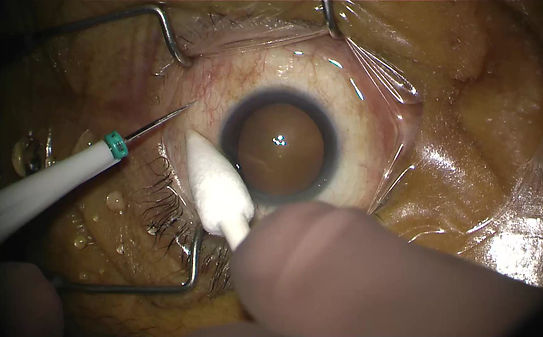
RETINA DETACHMENT SURGERY in Singapore
Retina detachment is a blinding condition that requires urgent surgery. Depending on the patient's eye condition, the type of surgery needs to be tailored to the individual in order to achieve the best outcome. It is important to see a Retina specialist as soon as possible so that an assessment can be done to determine the most appropriate treatment.
Surgical Options
VITRECTOMY FOR RETINA DETACHMENT REPAIR
This involves removing the vitreous gel in the eye and flattening the retina by injecting a gas bubble. The retina tear is treated with laser. The patient needs to posture face down after surgery.
SCLERAL BUCKLING SURGERY
A silicone band is sutured to the wall of the eye externally to create an indent that supports the retina break and in turn allows the retina detachment to settle.
PNEUMATIC RETINOPEXY
A gas bubble is injected into the eye to seal the retina tear and flatten the retina. Cryopexy or laser is then applied to seal the tear.
Retina Detachment - Frequently Asked Questions (FAQ)
Answers by Dr Paul Zhao, Retina Specialist in Singapore
1. What is a retina detachment?
Retinal detachment (also known as retina detachment) is a serious eye emergency where the light-sensitive retina pulls away from the back of the eye. Without prompt treatment by a retina specialist, it can cause permanent vision loss. In experienced hands, retinal detachment repair has over 90% success rate in acute cases.
2. What are the warning signs of a retina detachment?
Common symptoms include:
-
Sudden onset of floaters (tiny moving spots)
-
Flashes of light (especially in the side vision)
-
A dark shadow or curtain over part of your vision
-
Sudden decrease in vision
These symptoms are painless but urgent. Seek medical attention immediately.
3. Is retina detachment a medical emergency?
Yes. A detached retina is an emergency that need prompt evaluation by a retina specialist. The earlier is treated, the better the chance of restoring vision.
4. What causes a retina detachment?
Common causes include:
-
Age related changes in the vitreous gel (posterior vitreous detachment)
-
Eye injury or trauma
-
Excessive eye rubbing
-
Previous eye surgery ( eg. cataract surgery)
-
Family history of retina detachment
5. How is a retina detachment diagnosed?
Diagnosis is done through a dilated eye examination. Dr Zhao may use:
-
Ocular imaging (OCT, B-scan ultrasound)
-
Wide field retina photography
These tests help to locagte and document the detachment and assess the severity.
6. What are the treatment options?
Treatment depends on the type and location of the detachment:
-
Vitrectomy: Microsurgery to remove the vitreousand reattach the retina
-
Scleral buckling: A band placed around the eye to relieve traction
-
Pneumatic Retinopexy: A gas bubble injected into the eye to push the retina back
-
Laser therapy or Cryotherapy: Used to seal retina tears
Dr Paul Zhao performs all major forms of retina reattachment surgery at multiple private hospitals in Singapore
7. Is retina detachment surgery painful?
The surgery is typically performed under regional anaesthesis with deep sedation or general anaesthesia. The patient may feel some pressure on the eye during the surgery but should not feel any pain.
8. How long is the surgery?
Surgery should last about 1 to 2 hours for routine retina detachment surgery. Certain types of retina detachment, espicially chronic cases with extensive scarring may take up to 3 hours.
9. What is the recovery like after surgery?
-
Most patients go home the same day
-
You may need to maintain a face-down position for several days (if a gas bubble is used)
-
Vision recovery can take weeks to months
-
Follow up visits are essential to monitor healing
10. What is the success rate of retina detachment surgery?
Dr Paul Zhao's success rate is over 90% for acute retina detachment cases. The visual outcome depends on how quickly the treatment was done and whether the macula (central retina) was affected. For chronic retina detachments (more than a few weeks) and redetachments with scarring, the success rate may be lower due to the increased complexity of the condition.
7. What is the risk of a retina detachment in the other eye?
If you've had a retina detachment in one eye, the risk in the other eye is about 10-15%. Preventive treatment with laser or cryopexy to areas of retina thinning can reduce the risk of a retina detachment in the fellow eye.
Need an Urgent Retina Evaluation?
If you have symptoms of a retina detachment, do not delay.
Dr Paul Zhao sees patients at:
Mount Alvernia | Novena| Orchard | Parkway East
Call +65 90668811 for an urgent same day appointment

Vitrectomy for Retina Detachment Repair
